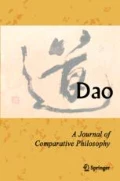Abstract
In this essay I argue that if Kantian and consequentialist ethical theories are vulnerable to the so-called “problem of alienation,” a virtue ethics based on Xunzi’s ethical writings will also be vulnerable to this problem. I outline the problem of alienation, and then show that the role of ritual (li) in Xunzi’s theory renders his view susceptible to the problem as it has been traditionally understood. I consider some replies on Xunzi’s behalf, and also discuss whether the problem affects other Confucian and eudaimonian approaches to virtue ethics. I close by considering some solutions to the problem and the affect that this result has on the argumentative dialectic between the three major ethical traditions.
Similar content being viewed by others
References
Ames, Roger and Henry Rosemont. 1998. “The Chinese Lexicon.” In their The Analects of Confucius: A Philosophical Translation, 45-65. New York: Ballantine Books.
Anscombe, Elizabeth. 1958. “Modern Moral Philosophy.” Philosophy 33: 1-19.
Baron, Marcia. 1984. “The Alleged Moral Repugnance of Acting from Duty.” Journal of Philosophy 81: 197-220.
Doris, John. 1998. “Persons, Situations, and Virtue Ethics.” Noûs 32.4: 504-530.
Foot, Philippa. 1978. “Nietzsche: The Revaluation of Values.” In her Virtues and Vices and Other Essays in Moral Philosophy, 81-95. Berkeley, CA: University of California Press.
Hursthouse, Rosalind. 1991. “Virtue Theory and Abortion.” Philosophy and Public Affairs 20: 223-46.
Hutton, Eric. 2001. “Xunzi.” In Ivanhoe and Van Norden 2001, 255-309.
_______. 2006. “Character, Situationism, and Early Confucian Thought.” Philosophical Studies 127: 37-58.
_______. 2008. “HAN Feizi’s Criticism of Confucianism and its Implications for Virtue Ethics.” Journal of Moral Philosophy 5: 423-453.
Ivanhoe, Philip J. 2000. Confucian Moral Self Cultivation. 2nd ed. Indianapolis, IN: Hackett.
Ivanhoe, Philip J. and Bryan Van Norden, eds. 2001. Readings in Classical Chinese Philosophy. 2nd ed. Indianapolis, IN: Hackett.
______. 2001. “Important Terms.” In Ivanhoe and Van Norden 2001: 255-309.
Knoblock, John. 1994. Xunzi: A Translation and Study of the Complete Works. 3 vols. Stanford, CA: Stanford University Press.
Nagel, Thomas. 1979. “The Fragmentation of Value.” In his Mortal Questions, 128-141. Cambridge: Cambridge University Press.
Perry, John, Michael Bratman, and John Fisher, eds. 2006. Introduction to Philosophy: Classical and Contemporary Readings, 4th ed. Oxford: Oxford University Press.
Railton, Peter. 1984. “Alienation, Consequentialism, and the Demands of Morality.” Philosophy and Public Affairs 13: 134-171.
Slingerland, Edward. 2001. “Virtue Ethics, The Analects, and the Problem of Commensurability.” Journal of Religious Ethics 29: 97-125.
______. 2003. Confucius: Analects, with Selections from Traditional Commentaries. Indianapolis, IN: Hackett.
Slote, Michael. 1995. “Agent-Based Virtue Ethics.” Midwest Studies in Philosophy 20: 83-101.
Swanton, Christine. 2003. Virtue Ethics: A Pluralistic View. Oxford: Oxford University Press.
Stocker, Michael. 1976. “The Schizophrenia of Modern Ethical Theories.” Journal of Philosophy 73: 453-66.
______. 1996. “How Emotions Reveal Value and Help Cure the Schizophrenia of Modern Ethical Theories.” In How Should One Live?: Essays on the Virtues. Edited by Roger Crisp, 173-190. Oxford: Oxford University Press.
Van Norden, Bryan. 2007. Virtue Ethics and Consequentialism in Early Chinese Philosophy. Cambridge: Cambridge University Press.
Watson, Burton. 1973. HSÜN Tzu: Basic Writings. New York: Columbia University Press.
Williams, Bernard. 1973. “A Critique of Utilitarianism.” In B. Williams and J. J. C. Smart, Utilitarianism, For and Against. Cambridge: Cambridge University Press.
Williams, Bernard. 1981. “Persons, Character, and Morality.” In his Moral Luck, 1-19. Cambridge: Cambridge University Press.
Yu, Jiyuan. 1998. “Virtue: Confucius and Aristotle.” Philosophy East and West 48: 323-47.
Author information
Authors and Affiliations
Corresponding author
Rights and permissions
About this article
Cite this article
Harold, J. Is Xunzi’s Virtue Ethics Susceptible to the Problem of Alienation?. Dao 10, 71–84 (2011). https://doi.org/10.1007/s11712-010-9201-2
Published:
Issue Date:
DOI: https://doi.org/10.1007/s11712-010-9201-2




